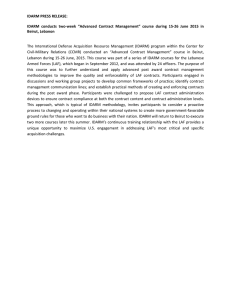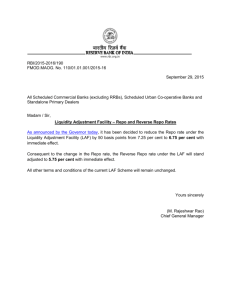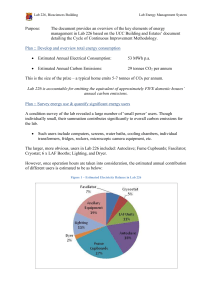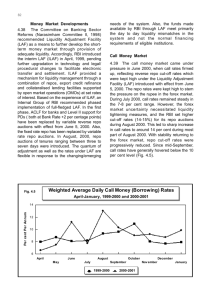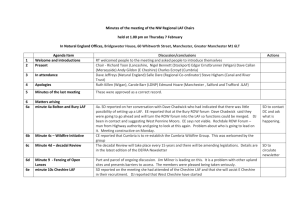LaF benchmarks
advertisement
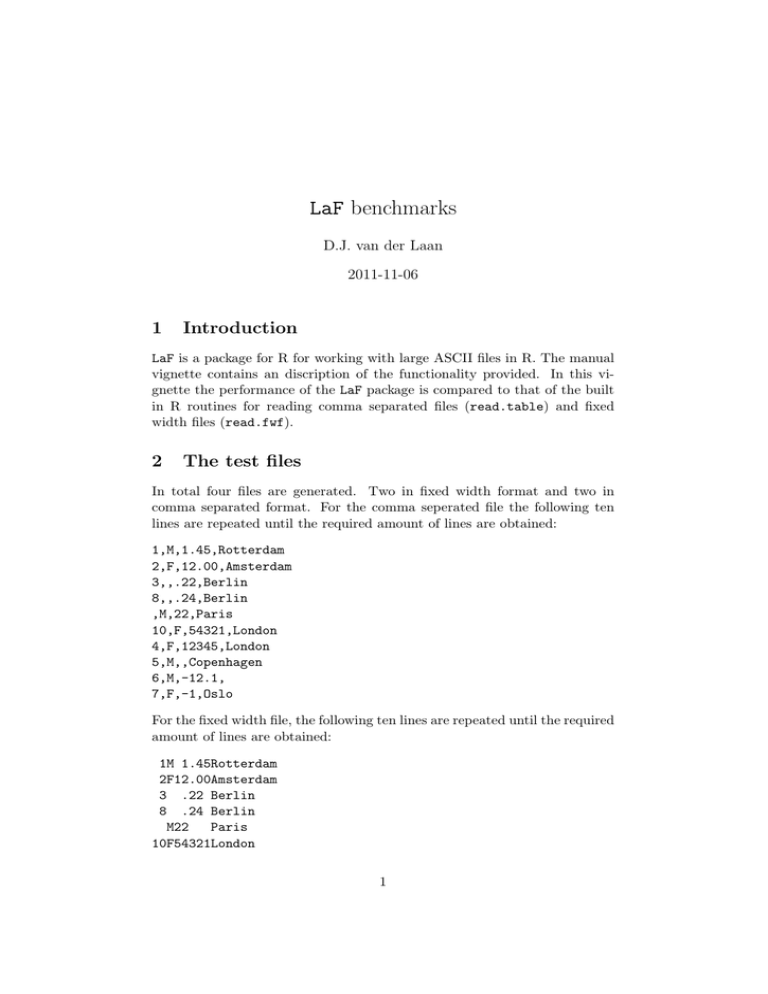
LaF benchmarks
D.J. van der Laan
2011-11-06
1
Introduction
LaF is a package for R for working with large ASCII files in R. The manual
vignette contains an discription of the functionality provided. In this vignette the performance of the LaF package is compared to that of the built
in R routines for reading comma separated files (read.table) and fixed
width files (read.fwf).
2
The test files
In total four files are generated. Two in fixed width format and two in
comma separated format. For the comma seperated file the following ten
lines are repeated until the required amount of lines are obtained:
1,M,1.45,Rotterdam
2,F,12.00,Amsterdam
3,,.22,Berlin
8,,.24,Berlin
,M,22,Paris
10,F,54321,London
4,F,12345,London
5,M,,Copenhagen
6,M,-12.1,
7,F,-1,Oslo
For the fixed width file, the following ten lines are repeated until the required
amount of lines are obtained:
1M 1.45Rotterdam
2F12.00Amsterdam
3 .22 Berlin
8 .24 Berlin
M22
Paris
10F54321London
1
4F12345London
5M
Copenhagen
6M-12.1
7F
-1Oslo
For each of the two formats two files are generated. One small one that is
used when reading the complete dataset into memory and a large one that
is used for all other operation. The small files consist of 100 000 rows the
large files of 10 000 000 rows.
3
Reading complete files
In the following tests a complete file of 100 000 rows is read completely into
memory.
3.1
3.1.1
Fixed width
LaF
> system.time({
+
laf <- laf_open_fwf(filename = filesmallfwf,
+
column_types = c("integer", "categorical",
+
"double", "string"), column_widths = c(2,
+
1, 5, 10))
+
tst <- laf[, ]
+ })
user
0.264
3.1.2
system elapsed
0.008
0.272
read.fwf
> system.time({
+
tst <- read.fwf(file = filesmallfwf,
+
widths = c(2, 1, 5, 10), comment.char = "",
+
colClasses = c("integer", "factor",
+
"numeric", "character"))
+ })
user
2.536
system elapsed
0.864
3.709
2
3.2
Separated
3.2.1
LaF
> system.time({
+
laf <- laf_open_csv(filename = filesmallcsv,
+
column_types = c("integer", "categorical",
+
"double", "string"))
+
tst <- laf[, ]
+ })
user
0.188
3.2.2
system elapsed
0.004
0.188
read.table
> system.time({
+
tst <- read.table(file = filesmallcsv,
+
sep = ",", comment.char = "", quote = "",
+
colClasses = c("integer", "factor",
+
"numeric", "character"))
+ })
user
0.132
4
system elapsed
0.000
0.132
Blockwise processing
Blockwise processing of files (reading and processing files in blocks or chunks
that fit into memory). In the following tests the sum of the third column in
the file is calculated using blockwise processing.
4.1
4.1.1
Fixed width
LaF
> calc_sum_laf <- function(block, result) {
+
if (is.null(result))
+
result <- 0
+
result + sum(block$V3, na.rm = TRUE)
+ }
> system.time({
+
laf <- laf_open_fwf(filename = filelargefwf,
+
column_types = c("integer", "categorical",
+
"double", "string"), column_widths = c(2,
+
1, 5, 10))
3
+
+ })
sm <- process_blocks(laf, calc_sum_laf)
user
8.693
system elapsed
0.048
8.747
The previous code can be made faster by using the columns argument of
process_blocks:
> system.time({
+
sm <- process_blocks(laf, calc_sum_laf,
+
columns = 3)
+ })
user
1.748
system elapsed
0.036
1.782
An other option is to first read the complete column into memory (if that
fits) and then work with the column in memory:
> system.time({
+
sm <- mean(laf[, 3], na.rm = TRUE)
+ })
user
1.804
4.1.2
system elapsed
0.400
2.206
read.fwf
The following code shows how a file can be processed in blocks using read.table
and read.fwf. First, a connection to the file is made and opened. When,
read.table is passed an open connection, it starts reading the specified
number of lines (n) and does not close the connection after reading. The
try block is needed in case the previous call to read.table stopped reading
exactly at the end of the file. Checking for the end-of-file is unfortunately
not possible in R (as far as I know). An other solution would be to use a
combination of readLines and read.table. However, this was found to be
much slower. Therefore, the solution below was choosen. It is used in most
examples with read.table and read.fwf in the following sections.
> calc_sum_r_fwf <- function(filename) {
+
result <- 0
+
con <- file(filename, "rt")
+
while (TRUE) {
+
block <- data.frame()
+
try({
4
+
block <- read.fwf(file = con,
+
n = 5000, widths = c(2, 1,
+
5, 10), comment.char = "",
+
colClasses = c("NULL", "NULL",
+
"numeric", "NULL"))
+
result <- result + sum(block[,
+
1], na.rm = TRUE)
+
})
+
if (nrow(block) < 5000)
+
break
+
}
+
close(con)
+
return(result)
+ }
> system.time({
+
sm <- calc_sum_r_fwf(filelargefwf)
+ })
user
247.683
4.2
4.2.1
system elapsed
91.957 339.809
Separated
LaF
> system.time({
+
laf <- laf_open_csv(filename = filelargecsv,
+
column_types = c("integer", "categorical",
+
"double", "string"))
+
sm <- process_blocks(laf, calc_sum_laf)
+ })
user
8.609
system elapsed
0.048
8.664
> system.time({
+
sm <- process_blocks(laf, calc_sum_laf,
+
columns = 3)
+ })
user
2.224
4.2.2
system elapsed
0.064
2.285
read.table
> calc_sum_r_csv <- function(filename) {
+
result <- 0
5
+
con <- file(filename, "rt")
+
while (TRUE) {
+
block <- data.frame()
+
try({
+
block <- read.table(file = con,
+
sep = ",", nrows = 5000,
+
comment.char = "", quote = "",
+
colClasses = c("NULL", "NULL",
+
"numeric", "NULL"))
+
result <- result + sum(block[,
+
1], na.rm = TRUE)
+
})
+
if (nrow(block) < 5000)
+
break
+
}
+
close(con)
+
return(result)
+ }
> system.time({
+
sm <- calc_sum_r_csv(filelargecsv)
+ })
user
10.125
5
system elapsed
0.036 10.160
Reading subset
In the tests below all data belonging to the municipality of ‘Rotterdam’ is
read.
5.1
5.1.1
Fixed width
LaF
> system.time({
+
laf <- laf_open_fwf(filename = filelargefwf,
+
column_types = c("integer", "categorical",
+
"double", "string"), column_widths = c(2,
+
1, 5, 10))
+
d <- laf[laf$V4[] == "Rotterdam ", ]
+
print(nrow(d))
+ })
[1] 1000000
user system elapsed
6
4.184
5.1.2
2.897
7.089
read.fwf
> system.time({
+
d <- data.frame()
+
con <- file(filelargefwf, "rt")
+
while (TRUE) {
+
block <- data.frame()
+
try({
+
block <- read.fwf(file = con,
+
n = 5000, widths = c(2, 1,
+
5, 10), comment.char = "",
+
colClasses = c("integer",
+
"factor", "numeric", "character"))
+
d <- rbind(d, block[block[, 4] ==
+
"Rotterdam ", ])
+
})
+
if (nrow(block) < 5000)
+
break
+
}
+
close(con)
+
print(nrow(d))
+ })
[1] 1000000
user
system elapsed
2099.623
92.869 2193.452
The example above takes a very long time. One of the reasons is that we
have a growing data.frame which is slow and memory inefficient. A faster
solution would be to first allocate the data.frame before reading. Unfortunately, the end size of the data.frame is usually not known beforehand.
One could first calculate the end size using code similar to that used in section 4, or one could guess the size. As an optimal example, using the usually
unknown end size of d, the following result is obtained (we will use d from
the previous example):
> system.time({
+
con <- file(filelargefwf, "rt")
+
i <- 1
+
while (TRUE) {
+
block <- data.frame()
+
try({
+
block <- read.fwf(file = con,
7
+
+
+
+
+
+
+
+
+
+
+
+
+
+
+ })
n = 5000, widths = c(2, 1,
5, 10), comment.char = "",
colClasses = c("integer",
"factor", "numeric", "character"))
sel <- block[, 4] == "Rotterdam "
d[seq_len(sum(sel)) + i - 1,
] <- block[sel, ]
i <- i + sum(sel)
})
if (nrow(block) < 5000)
break
}
close(con)
print(nrow(d))
[1] 1000000
user system elapsed
619.803 87.858 708.058
5.2
5.2.1
Separated
LaF
> system.time({
+
laf <- laf_open_csv(filename = filelargecsv,
+
column_types = c("integer", "categorical",
+
"double", "string"))
+
d <- laf[laf$V4[] == "Rotterdam", ]
+
print(nrow(d))
+ })
[1] 1000000
user system elapsed
5.308
0.448
5.758
5.2.2
read.table
> system.time({
+
d <- data.frame()
+
con <- file(filelargecsv, "rt")
+
while (TRUE) {
+
block <- data.frame()
+
try({
+
block <- read.table(file = con,
8
+
+
+
+
+
+
+
+
+
+
+
+
+ })
sep = ",", nrows = 5000,
comment.char = "", quote = "",
colClasses = c("integer",
"factor", "numeric", "character"))
d <- rbind(d, block[block[, 4] ==
"Rotterdam", ])
})
if (nrow(block) < 5000)
break
}
close(con)
print(nrow(d))
[1] 1000000
user
system elapsed
1699.907
2.800 1703.378
Using the usually unknown end size of d (see the discussion for read.fwf):
> system.time({
+
con <- file(filelargecsv, "rt")
+
i <- 1
+
while (TRUE) {
+
block <- data.frame()
+
try({
+
block <- read.table(file = con,
+
sep = ",", nrows = 5000,
+
comment.char = "", quote = "",
+
colClasses = c("integer",
+
"factor", "numeric", "character"))
+
sel <- block[, 4] == "Rotterdam"
+
d[seq_len(sum(sel)) + i - 1,
+
] <- block[sel, ]
+
i <- i + sum(sel)
+
})
+
if (nrow(block) < 5000)
+
break
+
}
+
close(con)
+
print(nrow(d))
+ })
[1] 1000000
user system elapsed
337.953
0.028 338.151
9
